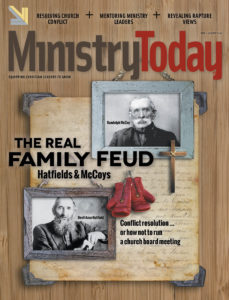Lessons from the Hatfields & McCoys
When someone makes a decision to follow Christ as their Lord and Savior, those outside the church tend to yawn or shrug, “They got religion.” But in the case of William Anderson (better known as Devil Anse) Hatfield, his conversion at the age of 71 is still making an impact more than a century after the fact.
The legendary Hatfields and McCoys feud of the late 19th century gathered considerable attention in recent years after the History Channel mini-series starring Kevin Costner and Bill Paxton. But around southern West Virginia, it has long been a staple of local folklore.
Lessons of Reconciliation

It looks at the lessons of what we all can learn from the reconciliation of the descendants of Devil Anse Hatfield and Randolph (Randall) McCoy.
A lot, it turns out. For the story, I interviewed Billy Hatfield, Devil Anse’s great-grandson; Hatfield’s sister, Heather Vaillancourt; and Ron McCoy, the great-great-great grandson of Randall McCoy—along with several people in the Pikeville, Kentucky area.
Originally, I expected to write a story about how pastors should never give up, since the man who regularly shared his faith with Devil Anse went dozens of years before seeing his efforts come to fruition.
However, the direction the story ultimately took proved even more interesting.
Resolving Conflict
Having interviewed Billy Hatfield more than a year ago for a story on a business leader in Tulsa, Oklahoma, I was already aware that he had been a pastor for several decades (one obvious impact of his great-grandfather’s decision). However, until we talked this spring, I didn’t grasp the valuable insights he has into conflict resolution.
One tidbit from our interview that didn’t make it into print concerned the significant number of people who search for a church because they’re looking for a surrogate father. If a pastor fails to fulfill that image, it often leads to conflict driven more by the member’s personal struggles than anything the pastor did, Hatfield told me.
Of course, there is a much broader series of conflicts than that in churches. Sadly, Christians who claim to follow a Savior whose leading message is forgiveness are often as caught up in the anger, bitterness and retribution that went to such extremes with the Hatfields and McCoys.
That’s sad, because as I look around at our polarized political climate during a presidential election year, I think the world is dying to see more examples of reconciliation played out before their eyes.
Doing the Tough Work

I had intended to talk with her after a mid-week evening service, only to discover when I arrived that she had been taken to the hospital that morning.
After getting her room number, the next night I went to the hospital. When I finished my apology and prepared to depart, I noticed there were huge circles of sweat under my armpits.
Because of various circumstances, our paths only crossed a few more times after that. She later died, leaving me with no regrets that I had left a crucial work of reconciliation unfinished.
The same decision faces everyone with fractured family relationships, old friends turned enemies, or other unresolved personal conflicts. As Vaillancourt says: “If we, the Hatfields and McCoys can reconcile, anyone—with God’s grace—can.”


